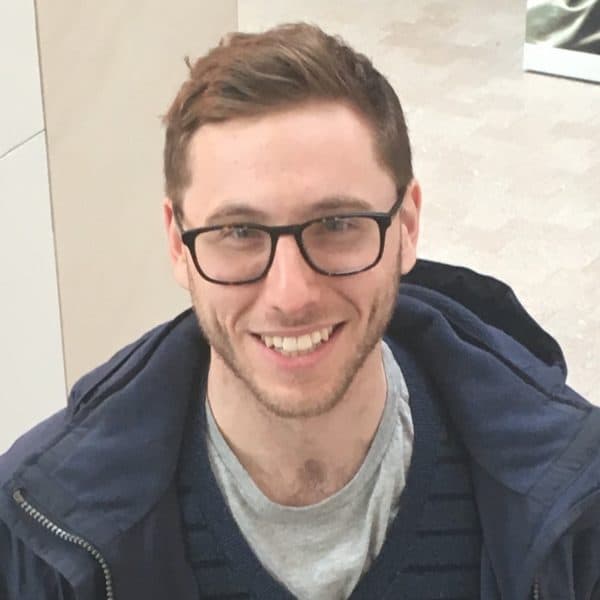Advertisement
Before The NFL Had Dr. Duvernay-Tardif, There Was Dr. Milt McColl
Resume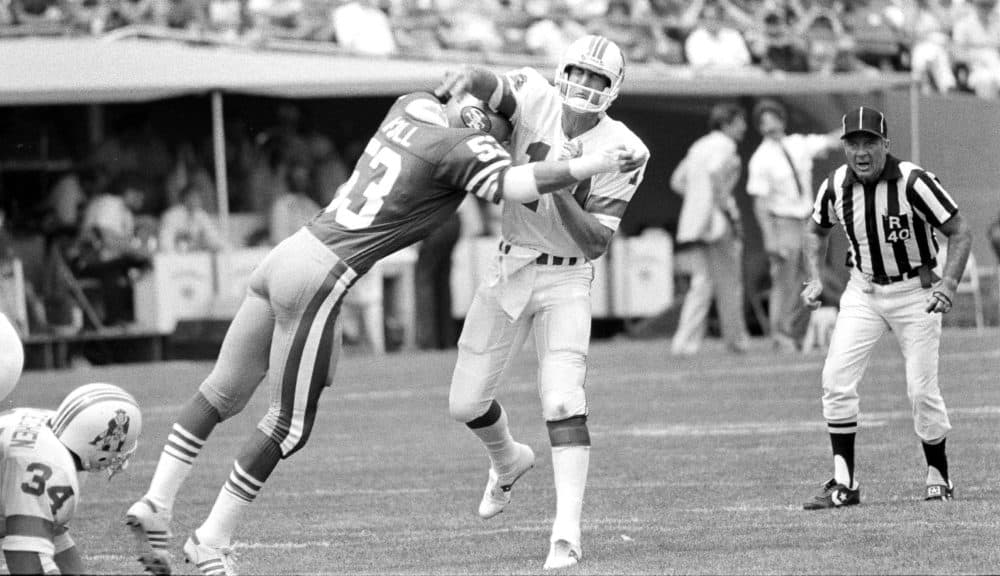
Back in May, Chiefs offensive lineman Laurent Duvernay-Tardif earned his M.D. from McGill University. But Duvernay-Tardif isn't the first NFL player to balance pro football and medical school.
The meeting was more than 35 years ago, but Milt McColl still remembers it well.
The year was 1981, and McColl was a rookie linebacker for the San Francisco 49ers.
He wasn’t exactly a top prospect. He’d gone undrafted, and might have only made the team because of an injury to another player.
And now 49ers head coach Bill Walsh wanted to meet with him.
"He called me up to his office, and it was about a 10-second conversation," McColl recalls. "And he said, 'Milt, I know there's other things going on in your life and I just don't think you're concentrating on football as much as you need to. And if you don't start concentrating harder, we're just gonna have to find somebody else.' ”
See, Milt McColl had been trying to keep a bit of a secret from his coach: in addition to his new job with the San Francisco 49ers, Milt McColl had also started medical school at Stanford.
"As far as I was concerned, it was what I did with my free time was what I did with my free time," McColl says. "I should be able to do whatever I want to do."
Coach Walsh apparently didn’t see it that way.
"That was the end of the conversation. There was no response from me. I was expected to walk out the door and focus 100 percent on football," McColl says. "So, I called my dad immediately that night, and I said, 'Dad, what do I do?' ”
And here’s where I should note that Milt McColl didn’t hatch this crazy play-pro-football-while-going-to-med-school plan all on his own. His own father had already done it.
Advice From Dad
Bill McColl was a two-time All-American end at Stanford. In 1951, he finished fourth in the Heisman Trophy voting. Bill was a top NFL prospect, but he also wanted to study medicine.
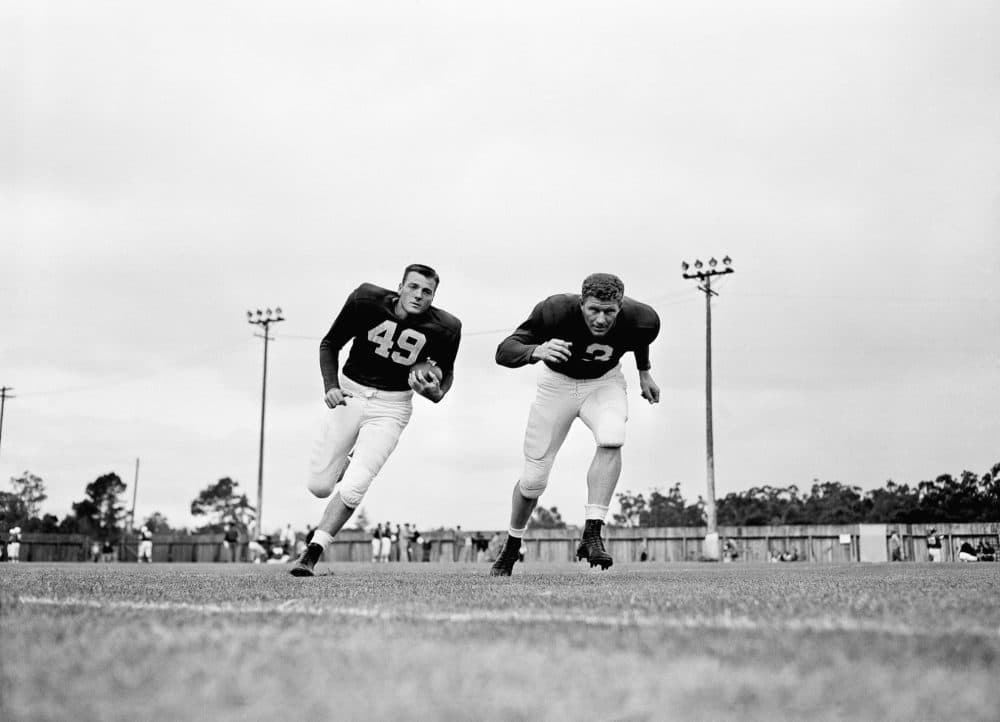
The Chicago Bears were willing to accommodate him. They drafted McColl in the third round and switched their practices from afternoons to mornings so that their young tight end could attend med school classes at the University of Chicago.
"And then he was able to get through his medical school and pretty much half of his residency while he played for the Bears for eight years," Milt McColl says.
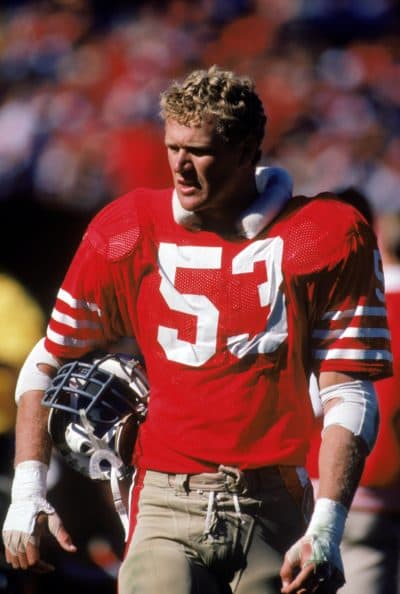
But the NFL was a different operation in the '80s than it had been in the '50s — most players didn’t need second jobs any more. Plus, Milt acknowledges he was never the athlete his father had been — which is all to say the 49ers definitely weren’t going to switch around their practice schedule to accommodate him.
And now head coach Bill Walsh had given Milt McColl the message that he needed to focus 100 percent on football.
Luckily for Milt, his dad had some advice.
"He said, 'Well, you have one thing to do. You have to prove to the coach that there's nothing more important in your life than football.' So, he said, 'You're gonna be last to leave practice every day. You're gonna run extra sprints,' ” McColl recalls. "And that's what I did. And it worked."
McColl fell into a routine that rookie season: he’d show up at the 49ers facilities around 7 or 8 in the morning. He’d practice, work out and study film until around 4 in the afternoon. Then he’d head to campus.
"I never stopped going to medical school, but my goal was to keep as low key as I could the rest of my career. And that’s what I did," he says.
McColl would sometimes be late for anatomy lab, but fortunately he was paired up with a future surgeon.
"Luckily for me, he would always get a great start on the cadaver," McColl says. "And then I would go in late at night and be up in the histology lab looking at slides."
Then McColl would wake up and do it again. That’s how he planned to spend his rookie season. It was a little crazy. But it wouldn’t last too long — after all the football season was going to end in December, which meant McColl could join his classmates in, you know, class at the start of the next quarter.
But there was a slight problem with that plan.
The 1981 San Francisco 49ers
After an eight-year playoff drought, the 1981 San Francisco 49ers — led by 25-year-old quarterback Joe Montana — won their division.
"The next thing we knew, we were in the playoffs," McColl says. "And I was, like, 'Well, what am I going to do?' Because I’d already missed the first quarter. I kept going to classes on the side, but I was thinking, 'Gosh, I can’t just keep getting behind and behind.' And the next thing you know, we were winning playoff games.
"We were already at least four weeks into the next quarter, 'cause it was almost February. And, the next thing, we were in the Super Bowl. So, literally, we won the Super Bowl, we had the big parade in San Francisco, and the next day I showed up in class. And I was really just gonna sneak into the back row. And as soon as I walked in the class, the lights were down low, and they flip the lights on, and they had a big cake down below. And everybody had been cheering for me.
"Apparently I'd had about 87 of my classmates were my best fans and had been following me all through all the playoffs."
McColl certainly wasn’t a star for that 49ers team, but he played well enough to stay on the roster. He ended up playing seven seasons for the 49ers. And, as his football career progressed, McColl eventually settled into a slightly saner routine: he stopped taking classes during the season. Then in the offseason he’d focus on medicine.
"And, of course, at times in the hospital people would actually recognize me or were told about who I was, and so it did have some distractions at times," he says. "One of my favorite stories was, it was my first month of doing obstetrics. And I was at Stanford hospital and I was in delivering a baby and — actually, I was just assisting, to be honest with you. But as soon as the baby was born, the father grabbed the baby and wanted a picture with me and the baby together. He forgot all about his wife and the birth.
"So he thought that was really exciting. I had to remind him, 'You know, your wife just had a baby. I think you better pay attention to her right now.' So he said, 'OK, great. We'll take a picture with all of us.' ”
Adding 'M.D.' To The Jersey
McColl won another Super Bowl with the 49ers at the end of the 1984 season. In March 1988 he received his M.D. from Stanford.
"The funny thing is I still see people today, and they all say they were in my medical school class," McColl says. "Well, that was because it took me about seven to eight years to get through medical school, so everybody ended up being in my class that had anything to do with Stanford through the 1980s."
After receiving his M.D., McColl played one final NFL season for the Los Angeles Raiders.
He planned to start his orthopedic residency — but ended up going into the medical device industry instead. After nearly 30 years in business, McColl recently began his residency in family medicine. He says many of his peers are the same age as his children.
"I frequently get called the happiest resident around just because I love what I’m doing so much," he says.
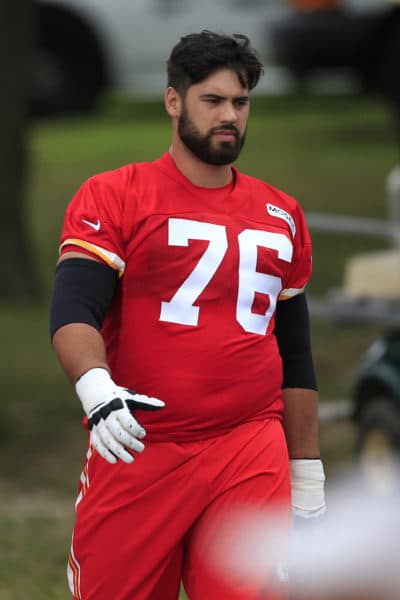
Even though he now occasionally pulls 24-hour shifts at the hospital, McColl has still found some time to follow the career of Chiefs offensive lineman/new M.D. Laurent Duvernay-Tardif.
And, of course, McColl’s been following the recent debate over whether Duvernay-Tardif should be allowed to have “M.D.” on the back of his jersey.
For the record, McColl, his father and Jim Kovach — another former linebacker who played in the NFL with an M.D. — didn’t go that route.
"Myself and Jim and my father — we all thought that just our own names was adequate on the back of the jerseys, but he certainly can put whatever he wants on his going forward," McColl says.
"So you're not kicking yourself for not asking for that yourself back in the day?" I ask.
"You know, after my discussion with Bill Walsh that day, I don't think I ever wanted to put 'M.D.' on the back of my jersey," McColl says. "I don't think it would've gone very well."
This segment aired on September 8, 2018.
